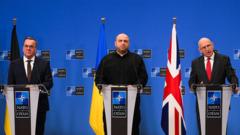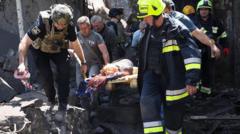Ukraine's European allies have convened on the backdrop of war, pledging €21 billion in new military assistance at a crucial meeting held at NATO's Brussels headquarters. With the conflict in Ukraine entering a critical phase, defense ministers from the Ukraine Defence Contact Group (UDCG) emphasized the ongoing need for military support against the Russian onslaught, particularly highlighting air defense amidst increased drone warfare.
Ukrainian Allies Announce €21 Billion Military Support Package Amid Ongoing Conflict

Ukrainian Allies Announce €21 Billion Military Support Package Amid Ongoing Conflict
New pledges of military aid from European allies signal enhanced support for Ukraine in its prolonged conflict with Russia.
Germany's Defense Secretary Boris Pistorius announced that Berlin would contribute €11 billion over the next four years. British Defense Secretary John Healey reinforced this with a commitment of £450 million towards radar systems, anti-tank mines, and drones, indicating a unified European response to evolving threats. This recent support follows earlier pledges from the UK amounting to £4.5 billion this year, emphasizing an aggressive military aid strategy.
Concerns regarding air defense were pivotal during discussions, with Healey noting the staggering capability of Russian forces, including the deployment of 10,000 glide bombs within three months. The UK officials highlighted that drones are responsible for the majority of battlefield casualties, reflecting a changing dynamic in modern warfare.
The gathering included representatives from 50 nations, and while U.S. Defense Secretary Pete Hegseth participated virtually, the ministers stressed the continuous multinational collaboration in supporting Ukraine. Ukrainian Defense Minister Rustem Umerov expressed gratitude for Europe's commitment to security assistance.
The discussions also touched on the stalled ceasefire negotiations, with leaders criticizing Russia's lack of willingness for peace amidst ongoing hostilities. As the international community watches, Kremlin spokesperson Dmitry Peskov indicated that dialogues with U.S. representatives would continue, albeit without expectations of significant breakthroughs.
On the ground, Russia reported captures near the Ukrainian border, raising alarms about further escalations in military actions.
As the situation develops, the coordinated military support from European nations signifies a determined stand against Russian aggression and a robust commitment to Ukraine's sovereignty and defense capabilities.
Concerns regarding air defense were pivotal during discussions, with Healey noting the staggering capability of Russian forces, including the deployment of 10,000 glide bombs within three months. The UK officials highlighted that drones are responsible for the majority of battlefield casualties, reflecting a changing dynamic in modern warfare.
The gathering included representatives from 50 nations, and while U.S. Defense Secretary Pete Hegseth participated virtually, the ministers stressed the continuous multinational collaboration in supporting Ukraine. Ukrainian Defense Minister Rustem Umerov expressed gratitude for Europe's commitment to security assistance.
The discussions also touched on the stalled ceasefire negotiations, with leaders criticizing Russia's lack of willingness for peace amidst ongoing hostilities. As the international community watches, Kremlin spokesperson Dmitry Peskov indicated that dialogues with U.S. representatives would continue, albeit without expectations of significant breakthroughs.
On the ground, Russia reported captures near the Ukrainian border, raising alarms about further escalations in military actions.
As the situation develops, the coordinated military support from European nations signifies a determined stand against Russian aggression and a robust commitment to Ukraine's sovereignty and defense capabilities.






















